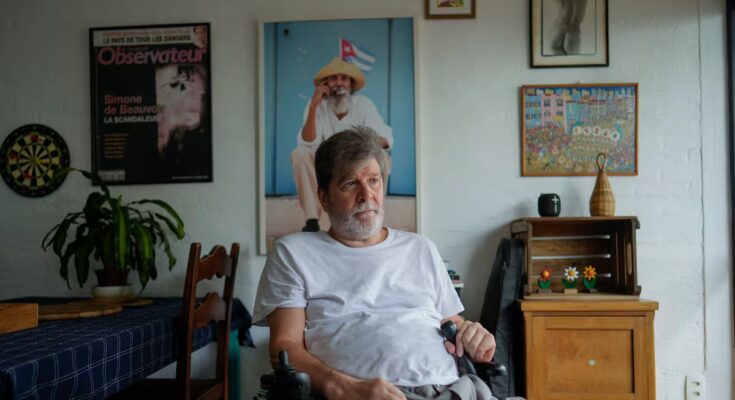It seems strange, but sometimes obtaining a death certificate, even if with important gaps, can be a joy, a great victory to celebrate. anyone who saw it I’m still herewho gave Brazil the first Oscar in its history, remembers the scene. Eunice Paiva, widow of MP Rubens Paiva, whose dictatorship has disappeared forever, poses proudly, with a smile and the document she just received at the registry office. It is 1996. Since then, Mrs. Paiva has been fighting for 25 years to know where her husband is.
— “She showed the death certificate to the press, as if it were a trophy. It was at that moment that I understood: this was the true heroine of the family,” writes her son, the writer and playwright Marcelo Rubens Paiva, in the autobiography of the same name that inspired the award-winning film by director Walter Salles.
Like the film, the work just published in Spanish by Shackleton Books with the translation by Sophia Neitzert Torres, tells the story of Eunice Paiva, but from a different perspective, so that they are complementary. The book, published in Brazil ten years ago, was seen as a fight against oblivion. To counter the memory loss from which Eunice, suffering from Alzheimer’s, suffers and her country’s difficulties in dealing with the legacy of the last dictatorship.
The writer Marcelo Rubens Paiva was a blond 11-year-old boy when his father disappeared. The dictatorship police arrested him in the family chalet in Rio de Janeiro; also to his mother and one of his sisters. They returned after a few days; him, never. Until that day in the summer of 1971, Marcelo’s childhood had been pure happiness. He lived with his four sisters and his parents opposite Ipanema Beach, in a villa full of joy, music and the constant movement of friends, including the teenager Walter Salles. The film’s director said that only over the years did he understand the historical significance of Paiva’s drama.
They never saw the patriarch again, a smiling civil engineer involved in politics whose job had been stripped away by the military regime a year earlier. The author says he understood that his father would never return, that he was dead, even if no one verbalized it, when after a few months his mother changed the double bed with a single one (here called single bed).
Paiva Jr. describes with extraordinary sensitivity how his mother, Eunice, who raised her five children while searching for her missing husband and reinvented herself as a lawyer for international organizations and artists (World Bank, Gilberto Gil, Sting…) to become one of the first specialists in indigenous law in Brazil, progressively sinks into oblivion. To the point of not knowing something as apparently trivial as what year he lives in. Typical question of neurologists and lawyers when evaluating patients. “Humiliated by the cerebral connections (…) she looked at us as if she were dragged by the current into the void of the ocean, she was about to drown, drowning in oblivion”.
The author decided to leave a written testimony of the family drama when the Truth Commission began to reveal the horrors left to history by a broad amnesty law. His mother was already immersed in that world of fog dominated by oblivion, a universe in which all the knowledge she had once treasured was simply incomprehensible blah, blah, blah, blah, blah, blah, when she added a new phrase to her limited repertoire: “Ainda is here“(I’m still here).
Ms. Paiva raised her children not to seek revenge – “fighting for redemocratization was the most effective revenge” – and encouraged them to smile in the face of adversity and in photos. And most importantly, they had to internalize the fact that they weren’t that special. “The Rubens Paiva family is not a victim of the dictatorship, the country is. The crime was against humanity, not against Rubens Paiva. We had to be healthy and tanned for the counteroffensive,” says the author.

Its history is not gray at all, it is dotted with light or bright moments. The delicacy and attitude from colleague to colleague, from judge to veteran lawyer, with which the official explains to Eunice, 77, that the document she will sign in front of her children is touching, is touching. The author, Marcelo, thus became the only son of the house motherfor practical and legal purposes, by one’s mother. (A role he had filled especially after the accident that left him quadriplegic at the age of 20, the raw material for his first book, Happy New Year, 1982).
He narrates with humor that his father, who grew up in a rich family and entered politics to help workers and the poor, studied with his companions which embassy to take refuge in in case of need. They chose the one in Yugoslavia, recently opened and, even better, with a swimming pool. The fired deputy ended up there after a cinematic getaway in a small plane and a Volkswagen Beetle.
The spectacular success of the film at the Brazilian box office gave a second life to this book, which entered the best-seller list. The story of the Paivas stood out from the others because this time the victims of the dictatorship were a bourgeois family, not guerrillas or soldiers. It facilitated empathy and multiplied its reach.
The current moment is propitious to watch the book or the film, issued last September the historic sentence which for the first time condemned some generals and a former president, Jair Messias Bolsonaro, for having plotted a coup d’état. Already recent years have invited us to reflect on the military regime. Brazil is still reeling from the aftermath of a Bolsonaro mob attack on the heart of democracy in Brasilia in 2023. America’s second most populous democracy has just shown that courts can punish those who undermine democracy from within.
The Golden Globe of which he is the protagonist I’m still here, Fernanda Torres, awarded for her performance as Eunice, was the prelude to an Oscar. Her mother, the legendary Fernanda Montenegro, appears briefly as the elderly matriarch, already suffering from Alzheimer’s. (Yes, this is a country of family clans, both in art and politics…).
Without taking heart away from the battles fought, Paiva’s son honestly portrays both his late father – a macho man, who wanted his wife at home waiting for him with a whiskey on the rocks, without working outside the home – and his mother.
“She was practical, cultured, thin, sensitive and a workaholic. Everything you don’t want in a mother,” he begins before going into detail: “My mother must have kissed me four times in my life, she took me to the cinema twice, to see the films she wanted to see: Doctor Zhivago AND Lawrence of Arabia. (…) Walks? With my grandmothers, my aunts and the mothers of my friends.” He tells it without rancor, with a smile and infinite affection towards the heroine of the family.
The impact of the Oscar brought the Paivas another victory in the fight they began half a century ago. A new death certificate for the victims of the dictatorship. Correct. No gaps. “Cause of death of Rubens Beyrodt Paiva: unnatural, violent, caused by the Brazilian state”.

I’m still here
Marcelo Rubens Paiva
Shackleton Books, 2025
304 pages, 22.90 euros


